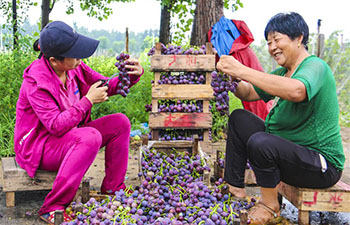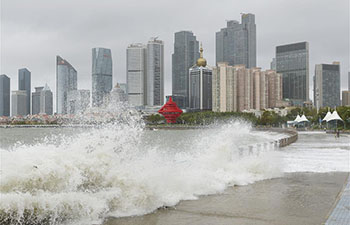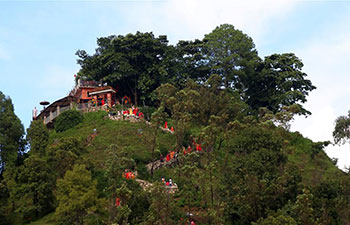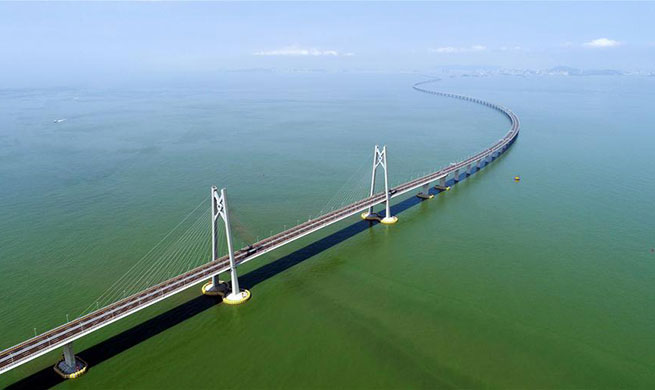by Tao Jun, Thanh Xuan
HANOI, Aug. 14 (Xinhua) -- Dao Hong Hue, 34, stepped into a food shop in Vietnam's capital city of Hanoi, looking for some fresh vegetables and meat to cook her family an appetizing dinner.
The shop named Organica on Thai Ha Street, claimed that it sells organic food items, ranging from fruits, vegetables and grains, to meat, eggs and dairy products. Being labeled "organic" implies that the product contains no antibiotics, no artificial colors, no GMOs (genetically modified organisms) and no synthetic pesticides.
Being more health-conscious, well-off, environmentally-conscious, and socially-conscious, more and more Vietnamese people are opting for organic products, leading to the recent boom of shops specialized in organic items, including food, cosmetics, clothes and decorative items.
The shop on Thai Thinh Street is Organica's fifth and newest establishments nationwide, following three in southern Ho Chi Minh City and one in central Da Nang city.
Despite their hefty price tags, organic food items appear to be more and more familiar to local customers. Hue, the housewife, told Xinhua that she decided to switch to organic items two years ago amid rising concerns about hygiene and safety of food sold at traditional markets.
"It's worth buying. Though I have to pay more, I don't need to worry much about food safety as strict production steps have controlled the risks of food contamination," she said.
According to a survey on customers' behaviors conducted in 2015 by global measurement and data analytics company Nielsen, Vietnamese shoppers are deeply concerned about food's origin. In particular, 77 percent of those polled said that fresh, natural and organic ingredients have either a "very heavy" or "heavy" influence on their purchasing decisions.
Over the past few years, there have been more and more shops selling organic food items in Vietnam's major cities, including Hanoi, Ho Chi Minh City and Da Nang. Brands like Organica, V-organic, Orfarm and Organic Home have introduced a frenzy of customers to the local market and are gaining popularity among locals.
Food manufacturers have wasted no time in jumping on the organic bandwagon. Vietnam's largest dairy firm, Vinamilk, launched a new line of product called Vinamilk Organic Milk in 2016 and established many organic farms.
In local supermarket chains, Co.opmart for instance, organic items like vegetables, seafood and rice are much pricier, but sales are on the rise.
"Thanks to improved living standards in recent years, we can afford these. But the point here is that we deserve good food to stay healthy," Hue said while putting some fruits into her cart, adding that choosing organic items is now very popular in her community.
From a broader perspective, Vietnamese people's fancy for organic products has not been limited to food. It has also expanded to cosmetics, clothes and decorative items, which are made from eco-friendly materials and illustrate commitments to the environment and social values.
In a small gift shop on Hanoi's Nha Chung Street, visitors can find a variety of products made from natural materials like tree bark and cotton, including notebooks, postcards, decorative items and toys.
Tohe Shop, named after "To he," a traditional toy of Vietnam made from rice powder and natural food coloring, is also famous for its unique designs which apply patterns from drawings of disadvantaged children, including those with autism and other disabilities.
Nguyen Ngoc Thuy, 26, comes to the shop quite often to buy presents for her friends. To her, the responsible business model of "To he" is key to its well-earned reputation.
"They spend a considerable part of their revenue supporting children in social protection centers and children with autism. That is admirable," Thuy explained as to why she has become the shop's loyal customer.
The survey by Nielsen pointed out that, Vietnamese consumers are among the most socially-conscious in the Asia Pacific region. Up to 86 percent of them are willing to pay extra for products and services that represent positive social and environmental impacts, compared to 76 percent of consumers in the overall region.
Despite their relatively high prices, products at shops like "To he" sell very well. In addition to retail shops in Hanoi, the brand has built up a wide distribution network with agencies in tourism cities, including Da Nang and Hoi An in the central region, and Ho Chi Minh City in the south.
According to Phan Thanh Van, manager of marketing and communications at "To he," sales of products surged 40 percent last year, indicating that more people had become familiar with the brand.
"Consumers like me are comfortable being charged more for these products, because they are made with delicacy and are contamination-free. Moreover, it's very meaningful that you can offer one helping hand to disadvantaged people in such a nice manner," explained Thuy.













